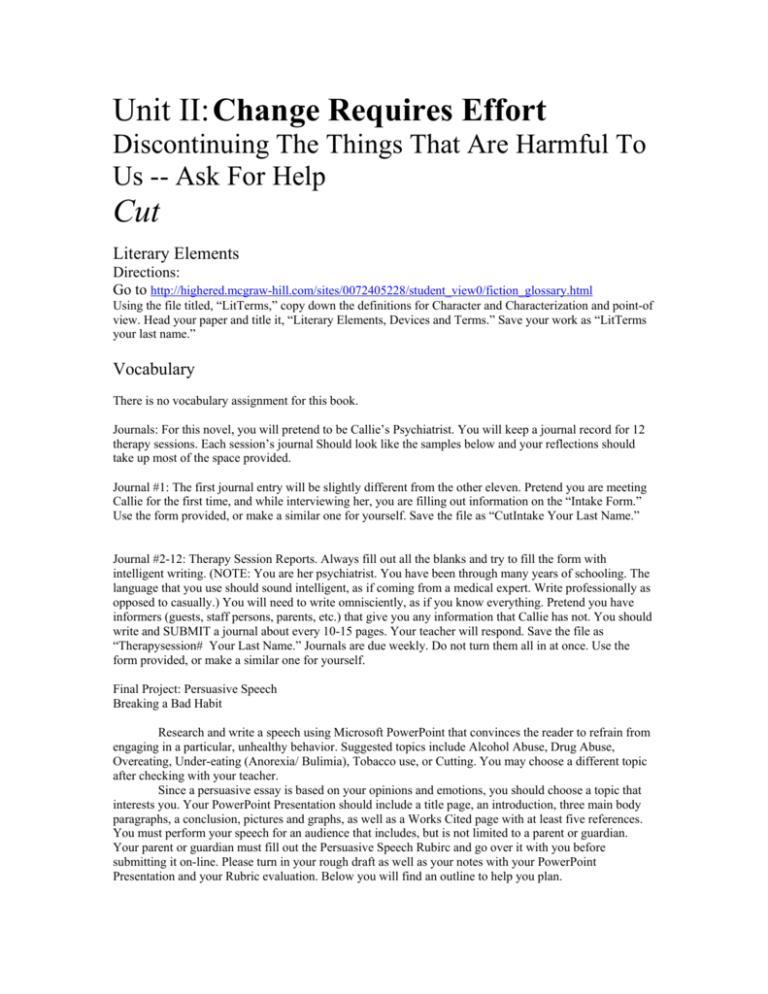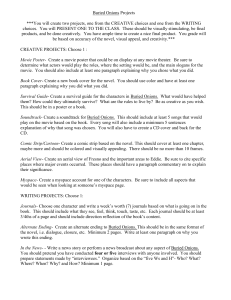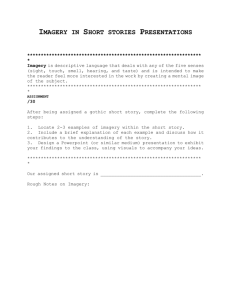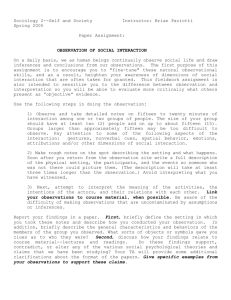CBL 100A Unit II
advertisement

Unit II: Change Requires Effort Discontinuing The Things That Are Harmful To Us -- Ask For Help Cut Literary Elements Directions: Go to http://highered.mcgraw-hill.com/sites/0072405228/student_view0/fiction_glossary.html Using the file titled, “LitTerms,” copy down the definitions for Character and Characterization and point-of view. Head your paper and title it, “Literary Elements, Devices and Terms.” Save your work as “LitTerms your last name.” Vocabulary There is no vocabulary assignment for this book. Journals: For this novel, you will pretend to be Callie’s Psychiatrist. You will keep a journal record for 12 therapy sessions. Each session’s journal Should look like the samples below and your reflections should take up most of the space provided. Journal #1: The first journal entry will be slightly different from the other eleven. Pretend you are meeting Callie for the first time, and while interviewing her, you are filling out information on the “Intake Form.” Use the form provided, or make a similar one for yourself. Save the file as “CutIntake Your Last Name.” Journal #2-12: Therapy Session Reports. Always fill out all the blanks and try to fill the form with intelligent writing. (NOTE: You are her psychiatrist. You have been through many years of schooling. The language that you use should sound intelligent, as if coming from a medical expert. Write professionally as opposed to casually.) You will need to write omnisciently, as if you know everything. Pretend you have informers (guests, staff persons, parents, etc.) that give you any information that Callie has not. You should write and SUBMIT a journal about every 10-15 pages. Your teacher will respond. Save the file as “Therapysession# Your Last Name.” Journals are due weekly. Do not turn them all in at once. Use the form provided, or make a similar one for yourself. Final Project: Persuasive Speech Breaking a Bad Habit Research and write a speech using Microsoft PowerPoint that convinces the reader to refrain from engaging in a particular, unhealthy behavior. Suggested topics include Alcohol Abuse, Drug Abuse, Overeating, Under-eating (Anorexia/ Bulimia), Tobacco use, or Cutting. You may choose a different topic after checking with your teacher. Since a persuasive essay is based on your opinions and emotions, you should choose a topic that interests you. Your PowerPoint Presentation should include a title page, an introduction, three main body paragraphs, a conclusion, pictures and graphs, as well as a Works Cited page with at least five references. You must perform your speech for an audience that includes, but is not limited to a parent or guardian. Your parent or guardian must fill out the Persuasive Speech Rubirc and go over it with you before submitting it on-line. Please turn in your rough draft as well as your notes with your PowerPoint Presentation and your Rubric evaluation. Below you will find an outline to help you plan. I. Introduction –Introduce with personal story. A. Tell what you are going to teach the reader about. B. Tell what you intend to convince the reader of. II. Body – Convince us NOT to!!! A. Reason 1 1. Example #1 2. Example #2 B. Reason 2 1. Example #1 2. Example #2 C. Reason 3 1. Example #1 2. Example #2 Include RELATED pictures, graphs, diagrams, etc. III. Conclusion –Remind read how important it is they heed your advice. A. Where to go for help #1 B. Where to go for help #2 IV. Provide a list of web sites where we might find more information if interested. Intake Form Patient Name: Date: Psychiatrist’s Initial Impressions (Patient’s Appearance, personality, level of Communication and interaction, enthusiasm for treatment, etc.) Other Guests in Ward – Diagnosis (Food, Substance, Cutting) 1. 2. 3. 4. 5. Psychiatrist’s Diagnosis: (State Acute Diagnosis, followed by suppositions on what is behind it based on initial clues.) Psychiatrists Initial Plan For Treatment: (State number of sessions will be required per week, estimated number of weeks to complete treatment, recommendations for patient safety, parent visits, etc.) Therapy Record Doctor: Date: Patient’s Name: Number of Days in Treatment: Patient Disclosures: (Verbal and Non-Verbal, what is said and not said, body language, etc.) Staff/Guest/Parent Disclosures: (What others tell you) Doctor’s Conclusions: (Predictions based on any above clues) Overall Patient Progress: (Excellent, Good, Poor) Estimated Graduation Date: Unit II: Change Requires Effort Overcoming Obstacles, Remaining True To Yourself Changing Your Playgrounds, Playmates and Playthings Buried Onions Literary Elements Directions: Go to http://highered.mcgraw-hill.com/sites/0072405228/student_view0/fiction_glossary.html Using the file titled, “LitTerms,” copy down the definitions for Image, Imagery, and Figurative Language. Head your paper and title it, “Literary Elements, Devices and Terms.” Save your work as “LitTerms your last name.” Vocabulary Directions: As you read, locate words that you do not already know. Using a word processing program, copy down the sentence in which the word is found. Underline the word. Then make your best guess as to the word’s meaning. Tell what you have based your guess on (context, word root, prefix, suffix, sounds like, etc.) Finally, using a dictionary or going to http://www.m-w.com/dictionary.htm look up the word and copy down the part of speech and the definition that most closely matches the meaning of your word. You should find fifteen words for each weekly reading assignment. Upon completing the week’s reading, you are to take your new words and build them into a summary of what you have read so far, underlining or bolding each vocabulary word. The second week’s installment should pick up where you left off, as should the third and fourth week’s if they are required . Upon completing the final summary, you should have a complete retelling of the plot, and you should have a firm grasp on 30+ new words. Your summaries should be typed, edited and spell checked before being turned in. They are due WEEKLY. Each entry should have a correct heading and a title. Please save the file as Vocab Book Name Last name. Journal Instructions: As you read, collect at least 9 examples of imagery or figurative language. Both imagery and figurative language are used by writers to place strange or vivid images into the reader’s head. These images or visualizations are intended to produce feeling, reaction or emotion. Write a half page response to each chosen quote. Tell why you chose it and describe the image produced in your mind, as well as the emotions accompanying the image. Write one final journal entry that reflects upon Soto’s use of imagery and Figurative Language in the novel. Evaluate its effectiveness in the story. Final Assignments 1. 2. 3. 4. Go to www.angelfire.com/mi/patter/fifteen.html and read the poem, “Fifteen” by William Stafford. Read it several times. Take special notice of imagery, rhythm, the refrain (“I was Fifteen”), number of lines per stanza, etc. Write your own poem, mimicking the style of “fifteen,” using Eddie and his story for the content. Correctly head your paper, Title it and save it as, “I Was Your Last Name.” Write a 1-2-page essay discussing why Buried Onions is a good title for this book. Correctly head your paper, Title it and save it as, “Buried Onions Your Last Name.” Compare and the endings in Cut and Buried Onions. How does each book end? Which ending do you think is more believable? Why? Is everything sewn up in the end? Is there a suggestion that everything is going to be OK, now? Do you believe the ending? How might you rewrite it? Your essay should be 2-3 pages in length, edited and spell-checked. Correctly head your paper, Title it and save it as, “Cut Buried Onions Comparison Your Last Name.” Unit II: Change Requires Effort Working Towards a Future Vision Life-long Learning/Following Your Conscience Always Running Vocabulary Directions: As you read, locate words that you do not already know. Using a word processing program, copy down the sentence in which the word is found. Underline the word. Then make your best guess as to the word’s meaning. Tell what you have based your guess on (context, word root, prefix, suffix, sounds like, etc.) Finally, using a dictionary or going to http://www.m-w.com/dictionary.htm look up the word and copy down the part of speech and the definition that most closely matches the meaning of your word. You should find fifteen words for each weekly reading assignment. Upon completing the week’s reading, you are to take your new words and build them into a summary of what you have read so far, underlining or bolding each vocabulary word. The second week’s installment should pick up where you left off, as should the third and fourth week’s if they are required . Upon completing the final summary, you should have a complete retelling of the plot, and you should have a firm grasp on 30+ new words. Your summaries should be typed, edited and spell checked before being turned in. They are due WEEKLY. Each entry should have a correct heading and a title. Please save the file as Vocab Book Name Last name. Journal: Every chapter begins with a quote. The quote is supposed to somehow relate to or embody the meaning of the chapter. After reading the chapter, write a half page reflection on how the chapter and the quote are related. There are eleven chapters. Please head and title your reflections. Save your file as, “Always Running Journal Your Last Name.” Final Assignment Research paper- 5 pages Using the library and/or the Internet, write a research report on the civil rights movement of the 1960’s and 1970’s. Your Report must have a Title page, visuals and a Bibliography Page. The written portion must be at least 5 pages in length and contain an introduction, a body and a conclusion. Your report must include at least 5 quotations, and you must have at least 5 sources on your Bibliography page. Please visit www.ri.net/schools/East_Greenwich/research.html for further assistance in researching and writing, including how to cite quotations properly and how to write a bibliography. Suggested Topics: Civil Rights Movement: An overview Voting Rights Segregation Martin Luther King, jr. Malcolm X Jesse Jackson United Farm Workers Movement Cesar Chavez Segregation in California You may choose another topic. Please have it approved by your teacher.


